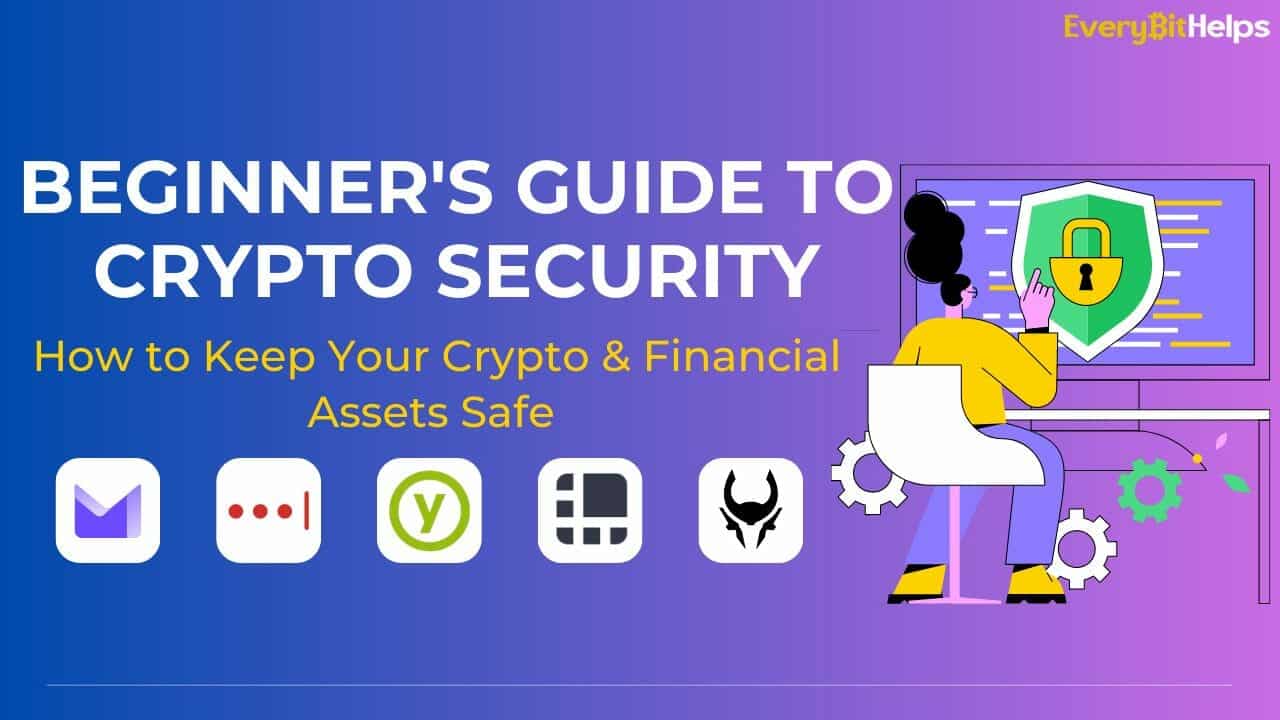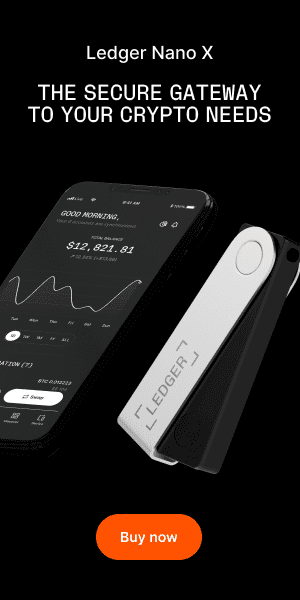In this article, we’ll explore some security measures and tools to keep your crypto safe and secure in 2023.
Online Security has never been more critical in the rapidly growing world of crypto and Web3. From phishing scams to exchange hacks, your digital and financial assets face a myriad of threats. To navigate this landscape, it’s crucial to understand security best practices and the available tools to protect your digital assets.
So, let’s dive in and help you navigate through the complexities of safeguarding your cryptocurrency in 2023, ensuring your digital assets remain untouched and secure.
5 Ways to Keep Your Crypto & Financial Assets Safe
We’ve put together this guide, presenting “5 Ways to Keep Your Crypto & Financial Assets Safe,” and designed it as a journey from the beginning to the end. Regardless of how many steps you choose to implement, adopting even one will help fortify your crypto assets.

1. Secure Email Account
Keeping your cryptocurrency safe requires a multifaceted approach, and secure email usage is a vital part of this process. Your email address often serves as a gateway to your online identity and a recovery method for many online accounts, including your crypto wallets and exchanges. If a hacker gains access to your email, they could potentially reset passwords and gain access to your crypto accounts.
Here’s why a secure email address matters:
- Recovery Method: Your email is often linked to your crypto wallets as a backup or recovery method. A secure email account makes it harder for a malicious party to reset your wallet’s password and steal your crypto.
- Notifications: You usually receive notifications about transactions and changes to your crypto account settings via email. If someone gains unauthorized access, you could miss these important alerts.
- Phishing: Phishers can send emails pretending to be a service you use, trying to trick you into revealing your private keys or login information. A good secure email provider can help filter out these types of scams.
While many free email providers like Gmail or Outlook offer security features, there can be some potential issues:
- Privacy Concerns: Free email services often employ data mining techniques to deliver targeted advertisements, which could mean that your data is being shared with third parties.
- Limited Security Features: While they do have basic security measures in place, free email services may not offer advanced security features like end-to-end encryption, zero-access encryption, or self-destructing emails.
- Customer Support: Free services might not provide prompt or personalized customer support if you encounter issues or security concerns.
Considering these factors, it can be worthwhile to explore secure email options (like Proton Mail we discuss below) that address privacy concerns. These services generally provide more robust security features, better privacy policies, and superior customer support.
What do we Recommend?
We use Proton Mail, and it’s an excellent choice for those who prioritize high security and value additional features. For cryptocurrency users, privacy is of paramount importance. Proton Mail respects this need by blocking hidden email trackers, preventing potential profiling based on users’ online activity. Plus, Proton doesn’t monetise user data or serve ads, thus maintaining the confidentiality of user data.
Even a free Proton account keeps your emails end-to-end encrypted. If you wish to support the company and their mission to build a better, more private Internet, you can upgrade to a paid plan with premium features (like bigger storage).
Its advanced anti-phishing tools like PhishGuard, smart spam detection, link confirmation, and domain authentication warnings are vital in protecting users from scams and phishing attempts.
Aside from email security, Proton Mail also offers a VPN service, adding an extra layer of security to your online activities by encrypting your internet connection and hiding your IP address. Additionally, ProtonMail provides secure storage solutions, allowing you to store and manage sensitive files safely.
While no email service can guarantee absolute security, Proton Mail is a standout choice for safeguarding your digital footprint, which is particularly important in the realm of crypto. The choice of an email provider should be made based on your specific needs and the value of the information you intend to protect.

2. Secure Passwords
Having secured your email, the next critical step in securing your cryptocurrency assets is ensuring your passwords are strong, unique, and well-managed. You must maintain a robust password hygiene for your accounts, which entails using complex, lengthy, and unique passwords.
Cybercriminals employ techniques like brute-force attacks and dictionary attacks to guess passwords, so having a unique and complex password is a shield against such methods.
A complex password uses a mix of uppercase and lowercase letters, numbers, and special characters. It’s crucial to avoid using the same password across different accounts; this way, a breach on one platform won’t compromise your other accounts.
However, managing numerous intricate passwords can be a daunting task. That’s where a password manager comes into play. A password manager is a secure tool that stores all your passwords in an encrypted vault, essentially acting as a digital safe for your passwords. It also assists in generating and retrieving complex passwords. You only need to remember one master password to unlock your password manager, and it will handle the rest, making the process of maintaining high security across all your accounts, including your crypto wallets and exchanges, much more straightforward.
What do we Recommend?
There are various password managers on the market, each with its unique features.
- Dashlane: Known for its user-friendly interface and comprehensive security dashboard that gives insights into your password health. It also provides a VPN service.
- ProtonPass: Keeps your passwords and identity secure with rigorous end-to-end encryption. Brought to you by the scientists behind Proton Mail.
- 1Password: Highly regarded for its robust security and integration across devices and browsers. It also features Travel Mode, which removes sensitive data from your devices when you’re crossing borders.
- LastPass: Recommended for its ease of use and advanced security features. LastPass provides secure storage of your passwords and assists in generating complex, unique passwords. It also supports two-factor authentication for an added layer of security.
Despite the benefits, it’s important to remember that while password managers add a layer of convenience and security, they aren’t entirely without risk. If someone gains access to your master password, they can access all your stored passwords. For this reason, many password managers offer two-factor authentication (2FA), adding an additional layer of security.

3. Two-Factor Authentication (2FA)
Two-Factor Authentication (2FA) is an extra layer of security designed to ensure that you’re the only person who can access your account, even if someone knows your password. It typically involves two out of three types of credentials: something you know (like a password), something you have (like a physical token or a smartphone), and something you are (like your fingerprint).
2FA is essential because it adds an extra barrier to your accounts, making it much harder for unauthorized users to gain access. If your password falls into the wrong hands, 2FA ensures that the intruder can’t access your account without the second factor.
Examples of 2FA applications include:
- Text Messages (SMS): A code is sent to your mobile device via SMS, which you then enter on the website or application. However, this method can be an issue due to the risk of SIM swapping attacks, where a hacker convinces your phone carrier to switch your number to their SIM card or intercept of the text messages by exploiting vulnerabilities in the cellular network.
- Google Authenticator: This smartphone app generates time-based one-time passwords (TOTP). When logging into a site or app, you open Google Authenticator to retrieve and enter the code.
- Authy: Like Google Authenticator, Authy is a smartphone app that generates TOTP codes. However, Authy also offers secure cloud backups and multi-device synchronization, allowing you to access your 2FA codes from several devices.
- YubiKey: YubiKey is a physical device that you plug into your computer or tap on your phone. It then provides a unique code (either by entering it directly or by pressing a button) to validate your identity.
Each 2FA method has its strengths and weaknesses. SMS is convenient but potentially insecure. Google Authenticator and Authy are more secure but require the extra step of opening the app and transferring the code. A physical device like YubiKey is even more secure, but it’s less convenient because you have to have the device with you at all times, and it may not be compatible with all devices.
What do we Recommend?
We recommend employing multiple forms of Two-Factor Authentication (2FA). However, as previously mentioned, we advise steering clear of SMS-based 2FA whenever possible. Instead, our recommended approach for 2FA is a combination of Google Authenticator or Authy and YubiKeys by Yubico.
The best method for you depends on your specific needs and threat model. Generally, any form of 2FA is better than none, but it’s essential to consider your security needs when choosing a 2FA method.
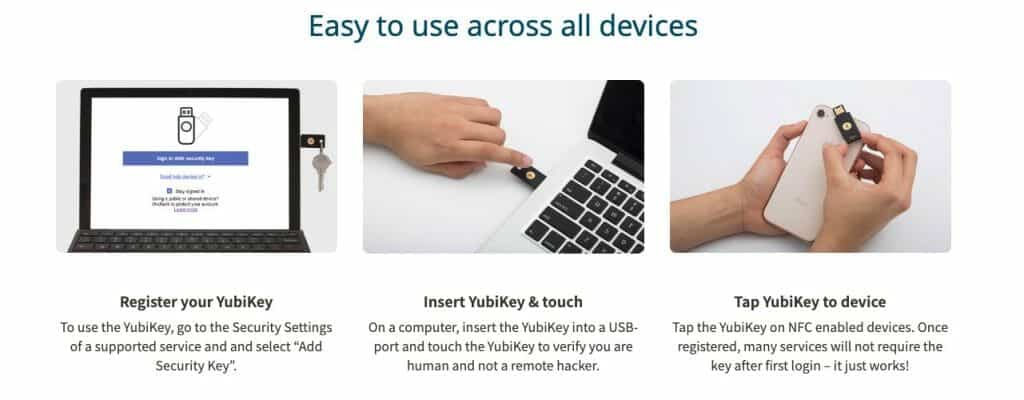
4. Cryptocurrency Wallet
Having a secure cryptocurrency wallet is vitally important in protecting your digital assets. Unlike traditional money, which is secured in banks or physical wallets, cryptocurrencies are purely digital, and their safety depends on how secure the environment is where you keep them.
Choosing a secure cryptocurrency wallet is crucial to safeguarding your digital assets. When choosing a crypto wallet, you want to be able to retain full control and ownership of your assets. Wallets, particularly cold or hardware wallets, store your private keys – the critical piece of data that allows you to control your cryptocurrencies – offline and away from potential online threats.
While crypto exchanges can offer convenience in terms of accessibility and ease of use, particularly for frequent trading, they carry inherent risks. Crypto exchanges have been targets of substantial hacking attempts, and some have even faced internal fraud or legal issues. When your crypto is on an exchange, it’s essentially in their control, and any adverse event affecting the exchange could lead to the loss or inaccessibility of your assets.
There are primarily two types of cryptocurrency wallets: Hot and Cold.
- Hot Wallets: These are wallets that are connected to the internet. They are very convenient and user-friendly, providing quick access to your crypto assets for trading or transactions. However, since they are connected to the internet, they are also more susceptible to online threats like hacking.
- Cold Wallets: These offline wallets are considered the most secure way to store cryptocurrencies. They are less convenient for quick trading, but their offline nature makes them much more secure, making them ideal for storing large amounts of crypto for a long period.
What do we Recommend?
Investing in a cryptocurrency hardware wallet is one of the most effective measures you can take to ensure the security of your crypto assets. While these wallets do carry a cost, the investment is worthwhile if you are serious about protecting your digital currencies.
We’ve experienced several hardware wallets, and the most popular and trusted brands are Ledger and Trezor. Each option offers unique benefits and features, which must be weighed against their cost to find the best fit for your requirements.
Ledger Wallets, such as the Ledger Nano S Plus and Ledger Nano X, are renowned for their robust security measures. They’re built around a secure chip and support a vast range of cryptocurrencies. The Ledger Nano X even offers Bluetooth functionality for easier management of your assets on the go.
Trezor Wallets, like Trezor One and Trezor Model T, also offer high-level security and wide crypto support. The Model T provides a touch screen for easy operation and advanced features such as the ability to sign and encrypt with GPG.
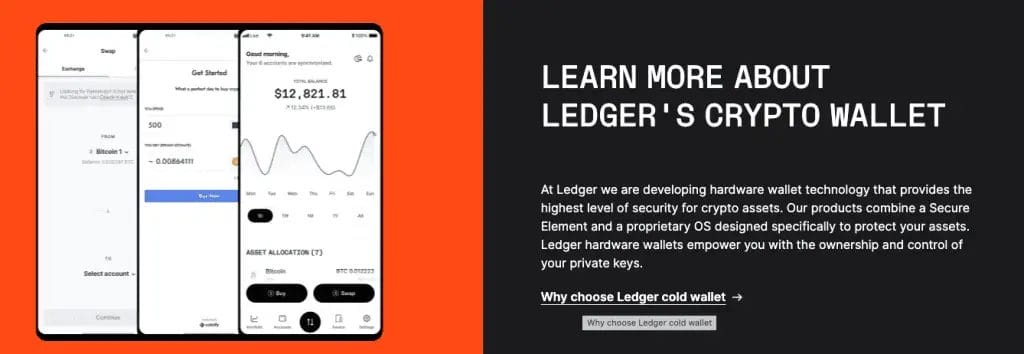
5. Crypto Seed Phrase
Managing the seed phrase to your hardware wallet is one of the most critical aspects of securing your digital assets, including cryptocurrencies and NFTs. The seed phrase, often a series of 12 or 24 words, serves as the backup key to your wallet. If your hardware wallet is lost, damaged, or stolen, this seed phrase is the only way to restore your assets.
If you mishandle or lose your seed phrase, whether it’s by sharing it, misplacing it, or failing to store it securely. You risk losing access to your digital assets permanently. Unlike traditional banking services, crypto wallet providers like Ledger and Trezor cannot help you recover your assets in case of loss of the seed phrase. This is due to the decentralized and secure nature of cryptocurrencies, only the holder of the seed phrase has access to the assets.
This responsibility for managing and securing your seed phrase is entirely on you, which some investors might find daunting. However, the implications of losing your seed phrase are serious, so it’s vital to take precautions:
- Never share your seed phrase with anyone. Treat it as you would your most valuable possession.
- Make sure to keep your seed phrase written down and stored in a safe, secure place.
- Consider making multiple copies and storing them in different locations for added security.
- Avoid storing your seed phrase digitally, as it may be susceptible to hacking.
Always remember: your seed phrase is as important as the digital assets it protects. Take the responsibility of managing it seriously.
What do we Recommend?
Obviously, we recommend keeping your hardware wallet seed phrase safe and secure. However, this is easier said than done. While it’s possible to store your crypto on multiple devices for added security, this approach can be costly, and managing multiple wallets can become complex.
As a more robust and cost-effective solution, we recommend using products such as Cryptotag. Cryptotag is a system that stores your recovery seed phrase on a titanium plate, which you can engrave yourself. This metal backup tool is designed to be fireproof, waterproof, and shockproof, significantly enhancing the physical security of your seed phrase.
Instead of having a piece of paper that could be easily damaged or lost, Cryptotag ensures that your recovery seed phrase is stored in a virtually indestructible format. This method ensures that even in the event of a fire or flood, your seed phrase is well-protected and remains accessible.
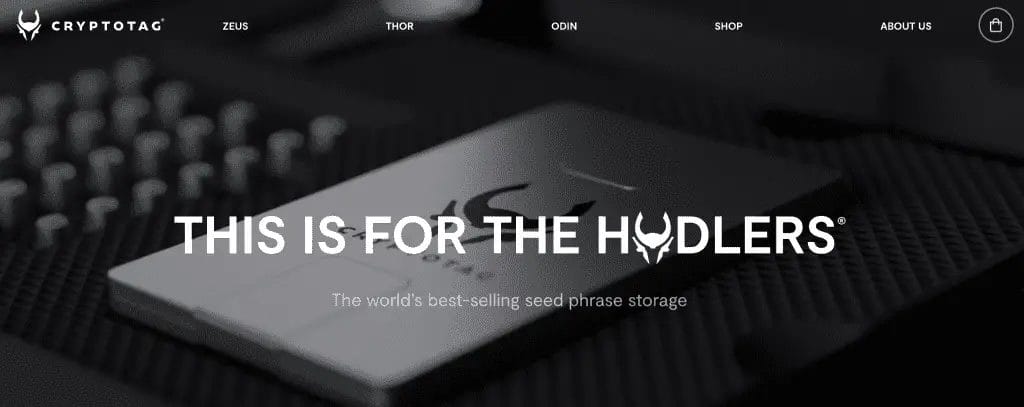
Other Crypto Security Measures to Consider
Securing your digital and financial assets goes beyond just email, password management, and hardware wallets. Several other practices contribute significantly to enhancing your overall online financial security. Here are a few recommendations:
- Secure Browsers: Consider using a privacy-focused browser like Braves or Firefox, which blocks third-party ads and trackers by default. For added protection, you can also use browser extensions like HTTPS Everywhere and Privacy Badger.
- VPN (Virtual Private Network): A VPN encrypts your internet connection, effectively hiding your online activities from potential eavesdroppers, including hackers and ISPs. This encryption is especially beneficial when using public Wi-Fi networks, which are often targets for cyberattacks. Furthermore, when crypto trading VPNs can mask your IP address, making your transactions more anonymous and safeguarding your personal information from potential threats.
- Privacy-Oriented Search Engines: Google may be convenient, but it also collects a significant amount of data about your search habits. Consider using privacy-oriented search engines like DuckDuckGo that don’t track your searches.
- Regular Software Updates: Keep all your devices and software updated. Regular updates not only provide new features but also fix security vulnerabilities that hackers can exploit.
- Phishing Awareness: Be aware of phishing attempts. Always double-check emails and messages before clicking links or downloading attachments. Never share sensitive information like your seed phrases or passwords.
- Secure Wi-Fi: Use a secure, password-protected Wi-Fi connection. Public Wi-Fi networks can often be insecure and exploited by bad actors to steal your data.
- Encryption: Use end-to-end encrypted messaging apps like Signal for sensitive communication. Encryption ensures that only the intended recipient can read your messages.
- Antivirus Software: Use a reliable antivirus program to protect your devices from malware and other threats.
- Webcam Cover: Physically cover your webcam when not in use. This protects against the remote possibility of hackers accessing your webcam.
- Data Backup: Regularly back up important data, including digital wallets and keys, to a secure, offline location.
Following these practices in conjunction with secure email, password management, 2FA, and hardware wallets can significantly bolster the security of your digital assets. Remember, every step you take towards better security decreases the likelihood of falling victim to cyber threats.
Conclusion
The world of cryptocurrency offers exciting opportunities for investment and growth, but it also presents unique challenges in terms of security. The decentralized nature of crypto means that individual users must take responsibility for their own digital asset security.
The process of securing your cryptocurrency does require effort, attention, and sometimes financial investment. However, it’s crucial to remember that these are not unnecessary burdens but essential steps to safeguarding your digital wealth.
We’ve outlined numerous security measures in this guide, ranging from secure email and password management to 2FA, hardware wallets, and even choices in your browser and online practices. The level of security you choose to implement ultimately depends on your personal comfort level, the value of your digital assets, and how much you’re willing to invest in securing them. The variety of options available allows you to choose the combination of tools and practices that suits you best.
However, regardless of the tools and technologies used, the most critical factor in your crypto security is your own actions. Be mindful of the websites you visit, the links you click, and the information you share. Keep your software updated, and never share sensitive information like your seed phrase.
Security is not a destination but an ongoing journey. It demands consistent attention and effort, but its peace of mind and financial protection make it a journey worth undertaking. In the dynamic world of cryptocurrencies, staying secure is staying ahead. Make your crypto security a priority in 2023 and beyond.
FAQs
What are the risks of cryptocurrency?
Cryptocurrency risks encompass market volatility, technological vulnerabilities (like wallet losses or hacks), regulatory challenges, and potential management issues in crypto exchanges or projects. Additionally, as a relatively new domain, the crypto landscape can be affected by evolving regulations, market sentiment, and technological advancements.
Is it safe to invest in crypto?
Investing in cryptocurrency carries inherent risks, much like any investment. While the crypto market offers high potential returns, it’s also highly volatile. It’s crucial to conduct thorough research, understand the market, and only invest what you’re willing to lose.
Can cryptocurrency be made secure?
Cryptocurrency relies on cryptographic techniques to secure transactions and control new coin creation. By following best practices like using hardware wallets, enabling two-factor authentication, and being wary of phishing attempts, users can significantly enhance their crypto security.
What is the most secure cryptocurrency?
Security in the cryptocurrency realm often depends on the technology and protocols behind a coin rather than the coin itself. Bitcoin, being the first and most widely adopted, has undergone extensive scrutiny and testing, making its blockchain one of the most secure. However, newer cryptocurrencies often incorporate advanced security features, so it’s essential to research individual coins and their underlying tech.
Is it safe to keep your crypto on Coinbase?
Coinbase is one of the leading cryptocurrency exchanges known for its robust security measures. They utilize cold storage for the majority of their assets and are insured against thefts and breaches. However, it’s always recommended to use a personal hardware wallet for large amounts and long-term storage to minimize potential risks.
What is the best way to secure your crypto?
The optimal way to secure your cryptocurrency is by using a hardware wallet, often referred to as a cold wallet. This offline device stores your private keys and ensures they’re not exposed to online vulnerabilities. Regularly updating software, using strong, unique passwords, and enabling two-factor authentication on all crypto-related accounts further enhances security.

